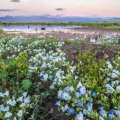Climate change, preserving ecosystems and greenhouse gas emissions are all under the microscope of a team of international experts, thanks to an initiative by a UQ researcher.
Dr Susanne Schmidt, from UQ’s School of Integrative Biology, has initiated a working group of 12 international experts to take action against the dangers facing the savanna biome (series of ecosystems with similar traits), which in turn plays a part in regulating the gases that cause climate change.
“We intend to raise awareness and present a global case for the savanna biome that draws together knowledge from four continents to highlight the threats that arise from a changing savanna biome,” Dr Schmidt said.
“We examine current uses of savanna, sustainable options, and draw attention to the plight of ethnic groups which rely on savannas for their livelihood.”
The Working Group on Savanna Nitrogen Relations, is funded by the ARC-NZ Network for Vegetation Function, and comprises international experts from Brazil, Venezuela, the United Kingdom, Germany and Australia, met for the first time this month (March 10-13) to discuss savanna function in context of threats, management and conservation.
The outcomes of the meeting include a synthesis of current knowledge of savannas, which will be published in a scientific journal later this year and presented to scientists and political decision makers.
Savannas, which can range from being near-treeless grasslands to dense woodlands, cover one fifth of the Earth’s land surface and are important areas of biodiversity, but are under threat around the world, Dr Schmidt said.
Agriculture, weeds, desertification, fire and climate change all threaten the savanna biome, leading to increased greenhouse gas emissions and depleted soil fertility.
Last week’s meeting was just the beginning, Dr Schmidt said.
“We have made a promising start and are inviting more scientists to join our initiative,” she said.
“There is considerable knowledge but also many uncertainties.
“As scientists we have the important role of synthesising and communicating knowledge and drawing attention to knowledge gaps.”
Media: Dr Schmidt (07 3365 0150) or Tegan Taylor at UQ Communications (07 3365 2659)
.jpg)



